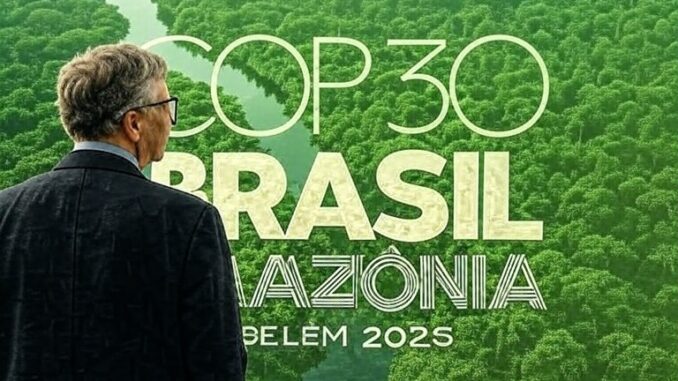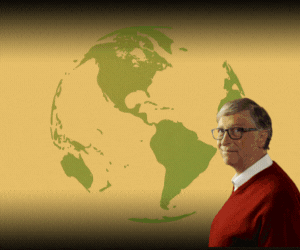
As the world gears up for the 30th United Nations Climate Change Conference (COP30) in Belém, Brazil, from November 10-21, 2025, the global conversation on climate action is undergoing a notable shift. Bill Gates, the billionaire philanthropist and longtime advocate for climate solutions, recently stated that climate change, while a serious problem, does not pose an existential threat to humanity.
In an October 2025 memo and subsequent interviews, Gates criticized the “doomsday view” pushed by some activists, arguing that an obsessive focus on carbon emissions has distracted from pressing issues like poverty and development.
Now that Bill Gates has said that Climate Change is not our biggest existential threat to Humanity, how much money has he cost the global markets?
This admission comes at a pivotal time, as COP30 aims to build on previous agreements amid emerging challenges like surging energy demands from artificial intelligence (AI) and potential reductions in U.S. funding under the current administration. But with tempered rhetoric on the climate crisis, what realistic accomplishments can the conference deliver?
COP30’s Ambitious Agenda: From Adaptation to Bioeconomy
The United Nations Framework Convention on Climate Change (UNFCCC) has outlined a comprehensive agenda for COP30, emphasizing practical, actionable themes to advance global sustainability.
Provisional agendas for the Conference of the Parties (COP), the Conference of the Parties serving as the Meeting of the Parties to the Kyoto Protocol (CMP), and the Conference of the Parties serving as the Meeting of the Parties to the Paris Agreement (CMA) highlight key sessions on emissions reductions, finance, and technology transfer.
Thematic days will spotlight critical areas, starting with adaptation, cities, infrastructure, water, waste, local governments, bioeconomy, and circular economy on November 10-11.
Subsequent discussions will cover mitigation, energy transitions, nature-based solutions, and just transitions for workers in fossil fuel-dependent economies.
Experts anticipate COP30 will push for accelerated action on nationally determined contributions (NDCs), with a focus on embracing climate strategies as economic opportunities rather than burdens.
The UN Environment Programme (UNEP) has released questionable fact sheets underscoring the need for enhanced adaptation finance, estimated at a gap of up to $284 billion annually.
Initiatives like improving multi-hazard early warning systems and phasing out fossil fuels fairly are also on the table, with calls for enforceable regulations over voluntary pledges.
In light of Gates’ views, the conference could pivot toward balanced approaches that integrate climate action with poverty alleviation and innovation, potentially leading to breakthroughs in carbon markets and forest finance.
Navigating Reduced U.S. Funding: A Test of Global Resilience
One of the biggest uncertainties hanging over COP30 is the impact of diminished U.S. involvement and funding. Under the current Trump administration, which took office in January 2025, U.S. climate policy has seen significant rollbacks.
Executive actions, including the “One Big Beautiful Bill Act” in July 2025, have eviscerated clean energy incentives and terminated millions in grants for environmental justice and diversity initiatives.
The administration’s “Unleashing American Energy” policy prioritizes fossil fuel production, signaling a retreat from international climate commitments.
This shift has broader implications for COP30. The U.S. has historically been a major contributor to global climate finance, but recent analyses rate its international public climate finance as “critically insufficient.”
Extensive cuts to overseas development assistance (ODA) could hinder progress on adaptation and mitigation in developing countries.
Supportive climate policies globally have dropped by 7.5%, while regressive ones have surged, slowing momentum ahead of the summit.
Developing nations may need at least $1.3 trillion annually by 2035 from external sources, making U.S. reductions a perennial stumbling block.
Despite this, COP30 could still make an impact through diversified leadership. Countries like Brazil, as host, and coalitions of 34 governments working on forest finance gaps demonstrate resilience.
A focus on subnational and private-sector initiatives—such as voluntary corporate disclosures on climate and forests, which increased 316% in 2024—could fill voids left by federal pullbacks.
Gates’ perspective might encourage a pragmatic approach, emphasizing innovation over alarmism to attract investment even without full U.S. buy-in.
The AI Energy Boom: A Double-Edged Sword for Climate Goals
Adding complexity to COP30’s agenda is the explosive growth in AI-driven energy consumption, which threatens to undermine emissions targets.
Data centers powering AI models are projected to more than double their power use by 2030, reaching 2,700 terawatt-hours globally by 2050.
This surge, led by expansions in the U.S. and China, relies heavily on fossil fuel backups due to the need for constant, reliable power, inflating costs and extending carbon lock-in.
Tech giants’ renewable energy purchases often fall short of ensuring 24/7 clean power, exacerbating grid instability and resource strains like water use in cooling systems.
COP30 must grapple with this by pushing for enforceable clean power strategies, carbon pricing, and global governance to balance AI’s benefits—such as optimizing energy efficiency—with its environmental costs.
Failure to address this could derail sustainability efforts, but success might involve integrating AI as a tool for climate acceleration.
Looking Ahead: Realism Over Doomerism
In the spirit of Gates’ recalibration, COP30 represents an opportunity to refocus climate action on achievable, welfare-oriented outcomes rather than apocalyptic narratives. There are many who think the UN has played its hand, and needs to be thrown out of the US, and 100% defunded. While that sounds great, you lose the voting ability to shut down bad policies. But that takes leadership to enforce that. Removing all funding and having a review of how they spend their money does sound like a good compromise, and I think that moving the UN’s headquarters to the EU would be a step in the right direction. As Stu Turley has brought up that the world is moving into two trading blocs. Those that follow Net Zero and deindustrialization, or those that follow low-cost energy and implement good regulatory processes to minimize the impact on the environment through good fiscal policies and science.
We can see that the UN has funded terrorist groups, and has been responsible for much of the global migrant crisis through funding of NGOs. They have one goal, and that is not aligned with the United States Republic.
While reduced U.S. funding poses challenges, the conference’s emphasis on adaptation, finance, and emerging issues like AI could foster meaningful progress through international cooperation and innovation. As energy markets evolve, platforms like Energy News Beat will continue tracking how these dynamics play out, ensuring readers stay informed on the intersection of policy, technology, and resources.
Got Questions on investing in oil and gas? Or do you have a Tax Burden in 2025?
ENB Top News
ENB
Energy Dashboard
ENB Podcast
ENB Substack







